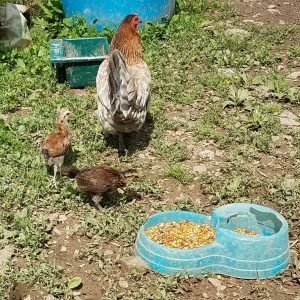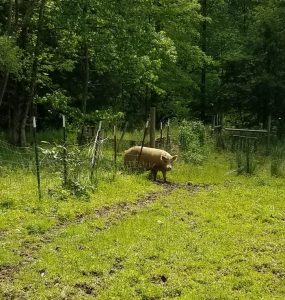Lots to Learn in a Short Amount of Time
I have been working with Elizabeth and John Malayter on their farm in Rogersville, Tennessee. I was delayed in getting started due to schoolwork and finals, so I haven’t done many hours yet, but I’ve learned a lot so far.

The farm is a small mixed-use property, and they have chickens, geese, ducks, turkeys, goats, rabbits, and hogs, as well as a hoop house for planting. A few of their goats and hogs are pregnant, and some of their free-range chickens have chicks running around with them.They try to avoid buying animals from markets, preferring to breed their own to create a sort of self-sustaining system.
Broiler chicks, however, are one of the animals they do purchase. Most of my time so far has been spent learning about the management and processing of the chickens. They grow incredibly fast, and need a lot of high-protein feed to sustain their growth rate. They’re ready to butcher after only 5 or 6 weeks! I got some firsthand experience with the butchering process, and learned how to scald, pluck, gut, and package them.

There was more to it than I expected. After they’re killed, the chickens have to be scalded at 140-155°F; any hotter and they start to cook, but any colder and the feathers won’t come loose. The scalding pot has some soap added to it, which helps the water penetrate the skin. It only takes a minute or two before the feathers are loose enough to pluck. Luckily they have a plucker, so we don’t have to do it by hand. After they’re plucked, they have to be gutted (which is a pretty messy endeavor!), packaged, weighed, and labeled. Most of the organs are also saved and packaged, like the liver, gizzards, and hearts, but the actual guts go to the hogs.
I also helped repair the bottom of the chicken tractor, which is used to house the broilers when they outgrow their coop and need more space. I disassembled an old chicken tractor that was falling apart and used the wire to replace the damaged and rusted-out parts of the bottom. They’re getting more chicks soon, so it’s good that we got some more space ready for them.
Even though I haven’t been able to do much yet, I’m really excited to get more involved now that classes are over. I’m looking forward to learning more!
Jody Horton, 2020 FARM Intern
J.E.M Farm